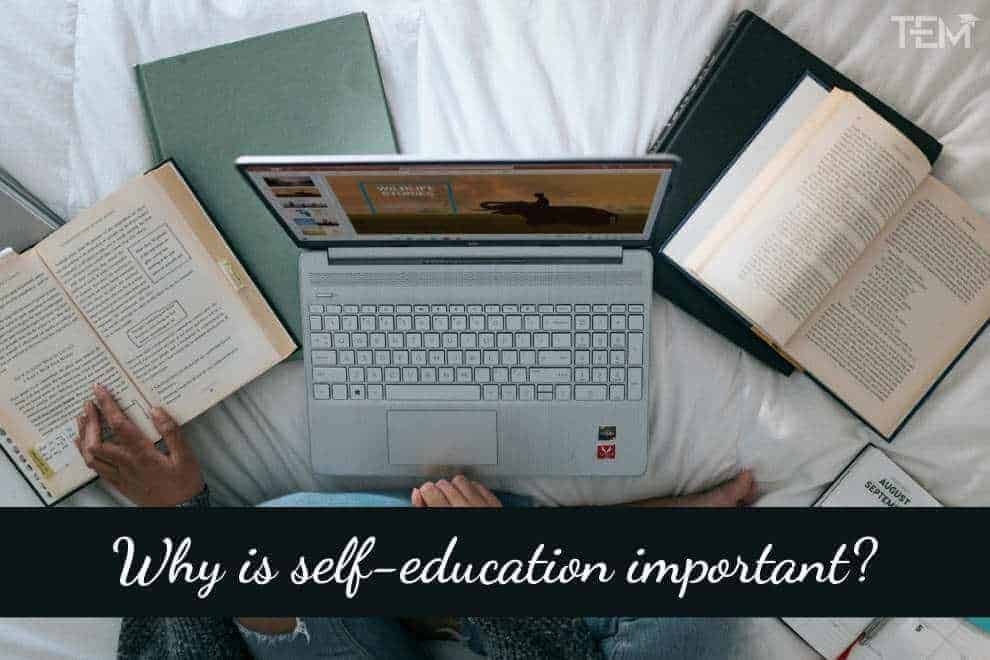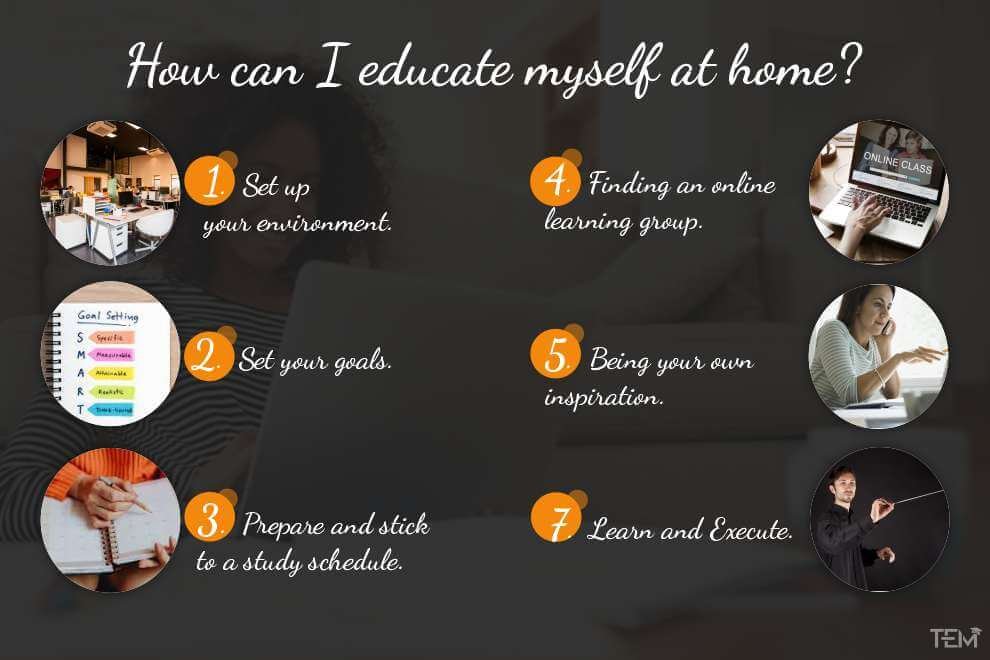“Self-education is, I firmly believe, the only kind of education there is.” ― Isaac Asimov
Self-education is one of those skills that will help you educate yourself on anything. Going to schools and colleges has now become a traditional way of pursuing education. But, it introduced us to new modes of learning through online and digital modes. Today, you can learn anything and everything in just a click.
For years, the value of education is stressed upon us. Our teachers motivate us to achieve greater results, our parents push us to aim for heights, and society appraises us for our learning accomplishments. With the passage of time, various modes of education began to surface that gave a tough competition to the print-form of learning. But, these forms of education, be it trade school or self-education, are barely discussed in domestic conversations.
Today, you do not need to work hard for scholarships or buy education loans to propel your education. All you need is an undistinguishable flame of motivation and spirit to strive for success—that being the core foundation of self-education.
Self-education, however, is different from learning by yourself. It allows you to pursue entire curricula by yourself and without the guidance of a tutor or professor. You can learn skills that you never thought of pursuing, you can inculcate new habits which you previously did not entertain, and the aspects are countless. In this blog, we will help you learn the ins and outs of self-education, and give you hints on how to pursue it without any hindrances.
What is self-education?

In layman’s language, self-education is education without the guidance of teachers or masters. Here, you set your own goals, arrange resources according to your preferred subject/topic, and schedule the required study rhythm and time. Individuals who opt for self-education may or may not have a formal education but their study can complement or be an alternative to formal education.
Did you know that there is a proper term for self-education? Self-education or self-learning or self-teaching is also known as ‘Autodidacticism’ (or autodidactism) and individuals who pursue self-education are known as ‘Autodidacts’.
Self-education is beneficial since you can curate your personalized reading materials and test your knowledge according to your own convenience. It has its own diverse set of importance.
Why is self-education important?

Instead of giving you a detailed elaboration on the importance of self-education, we will give you 5 major reasons that will give you help you frame the perfect answer to its necessity.
1. Set up your environment.
Ambiance plays a great role in boosting motivation and maintaining dedication towards your goals. Hence, prepare a study environment that is free from cacophonies and is not cluttered. Since you will not be learning in a classroom, it is important that you have a room in which you will do nothing but study. Make sure the room is equipped with a comfortable seating arrangement like a desk and a chair, laptop or other study gadgets like iPad or desktop, books, notebooks for note-making and other required stationeries, and a stable internet connection. If you want uninterrupted study sessions, consider checking if you are within HyperFiber service areas so you have reliable, high-speed internet access.
2. Do-It-Yourself Education (DIY)
You choose the subject. You collect the materials. You set your own schedule and frequency. You test your potential. You declare the results.
3. Self-education = Optimism.
It makes you an optimistic person because you will have more referrals. To simplify this, we would like you to think of it in this way: “If they can do it, I can do it too!”
4. Maintain pace with advances.
Not only does self-education help you gain diverse knowledge, it will also help you maintain pace with the advances in the world.
5. You will create more opportunities for yourself
By self-educating, you will know more things. You will possess the necessary knowledge to help you grow, and will also feel better knowing that you have grown in a way you’ve never done before.
Now that you have seen how important it is, we are certain that you are inclined to pursue self-education and become a ‘knowledgeably’ supreme!
How can I educate myself at home?

The trick is simple. Pick a topic or a subject. Arrange all the learning resources. Set a timeline. Voila! You are done.
No, that is not how it works. You need to follow a disciplined manner in order to self-educate yourself for the long run. Below, we have listed some important tips to get started on self-education.
1. Set up your environment.
Ambiance plays a great role in boosting motivation and maintaining dedication towards your goals. Hence, prepare a study environment that is free from cacophonies and is not cluttered. Since you will not be learning in a classroom, it is important that you have a room in which you will do nothing but study. Make sure the room is equipped with a comfortable seating arrangement like a desk and a chair, laptop or other study gadgets like iPad or desktop, books, notebooks for note-making and other required stationeries, and a stable internet connection.
2. Set your goals.
Set your goals. Make sure your goals are realistic and they align with your long-term future plans. Note down your study goals in a crystal-clear manner and pin them on the wall right so that it is always in front of you. This will help you be consistent with meeting them and not getting deviated from them. If it helps, you can break down your long-term goals into short ones as they will help you accomplish them in a comprehensive manner.
3. Prepare and stick to a study schedule.
You do not have to study from 10-7 or 6-11 at the night. You can study according to your convenience. But make sure that you stick to your schedule. You can follow study methods like 55-5 and others. If you need some help with managing your time or remember when you are supposed to follow your learning session, you can always use a tool like Google Calendar to properly schedule your day-to-day activities and make sure nothing important overlaps with your personal study time.
4. Finding an online learning group.
Learning with peers on online platforms can be a fun task. It helps build a study-like atmosphere, fights with isolation thoughts and aloofness, and can be a lot more beneficial than you can imagine. The key to keeping up with your learning process might be making accounting yourself accountable to others.
Learning a new skill with a friend, family member or even a member of a popular online group can really help you stick to your goal and make a lot more progress. It will enable you to communicate with others and learn from their individual experiences. You can also collect various tips and tricks to make your learning journey easier.
5. Being your own inspiration.
It is all about how disciplined and consistent you are throughout the entire process. Remember, learning is not linear. There will be demotivating factors or negative thoughts. You have to fight them off yourself. You can do so by:
- Following short drills
- Taking ample breaks and sleep
- Exercising and meditating
- Following a healthy diet, and
- Learning to channel your inner thoughts.
6. Learn and Execute.
Now that you have learned a whole different skill, it’s time to apply it and earn rewards. Even after learning something, you need to make sure that you are able to use it in a number of situations and that no matter what happens, you will not forget it. The best way to go about this is by using this new skill in every situation you can.
Summing Up:
Self-education is a roller coaster ride. There are ups and downs throughout the way. While it is a fun task, it can sometimes feel daunting to be your own savior. However, there is plenty of information available on the internet, which, if used correctly, can help you learn a lot of skills and further evolve in education.
Frequently Asked Questions for Self-Education
- Is self-education better than going to school?
If you are self-disciplined, determined, and optimistic self-education can be more advantageous than going to school. However, you can also inculcate the above skills through self-education. Formal education, on the other hand, is best suited or those who need structure, routine, constant guidance, immediate feedback, and enjoy being part of a classroom environment.
- Are there any disadvantages of self-education?
While there is a vast brighter side of self-education, there are several disadvantages to it too. Some of these can be no self-discipline, lack of in-person interactions, lack of flexibility, slow evolution, lack of transformational power, no peripheral benefits, to name a few.
- Are self-taught people smarter?
Although it is hard to give a binary answer to that, it is often acknowledged that a self-taught individual is smarter than regular people in certain topics that interest them the most. Most self-educators choose to learn different topics and study them in-depth.
- Why is it important to learn for ourselves?
Self-learning helps you identify problems and quickly look for effective solutions on your own. This could be from colleagues, the internet or by exploration. You get to learn how to actively look for solutions instead of having solutions brought to you. Thus, you can easily adapt to changes in the environment due to the ability to learn fast.
Related: 10 Best YouTube Channels for Learning You Should Follow


